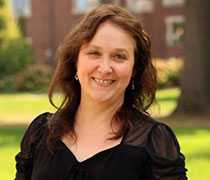 Tracy Farone
Tracy Farone
Grove City College Professor of Biology Dr. Tracy Farone’s observations about “one of God’s great gifts” are collected in a new book that focuses on her work outside the classroom.
“Honey Bee Vet: The Adventures of a Veterinarian Seeking to Doctor One of the World's Most Important Animals” details her journey as an animal doctor diving into a new field of study– the honey bee.
A clinical veterinarian before she became a professor, Farone became interested in beekeeping in the last seven years and started The Bee Project at GCC, which runs an on-campus apiary to study bees, hive health, and the public health impacts of apiculture. Farone keeps also her own bee hives and sells honey from her home in Portersville, Pa.
“Honey bees are very important little animals that deserve recognition equal to that of our other domesticated animals,” Farone said. They are responsible for pollinating crops in all regions “not only for themselves, but for the plants, animals, and humans … They are one of God’s great gifts to us,” she said.
The book compiles columns that Farone wrote for Bee Culture Magazine over the last four years and organizes her observation in eight “frames” – chapter titles that mimic the number of frames in a traditional bee box – covering everything from handling swarms to hive inspections in an entertaining, educational, practical, and inspirational style.
In one frame – “A Surgical Approach” – she muses about the appeal of her vocation. “Did you ever have a moment within the crazy pace of life where you suddenly stopped, looked around, and asked yourself how (or why) did I get here? I find myself asking this question now that I seem immersed in swarms of all stuff bees, something I would never have imagined 10 years ago. What is the appeal? … But it recently dawned on me that for me, it is surgery. I am a surgeon. I do not mind getting my hands dirty. I like to examine things, take things apart, find the problem, hopefully fix the problem, and put things back together for a positive outcome. That is beekeeping.”
The book is a resource for veterinarians, beekeepers, and others interested in one of the most critical agricultural animals on Earth and the complex, increasing health challenges honey bees face.
“Honey bees have medical problems just like the rest of us .. They get bacterial, viral, fungal, parasitic, and nutritional diseases. But we can also examine them, do diagnostic tests on them, and treat them for diseases to help make them better. I like that part,” Farone said. “Bees may seem very different from us and other animals, but we’re all from the same designer. As a vet, this concept is beautifully obvious.”
“Honey Bee Vet: The Adventures of a Veterinarian Seeking to Doctor One of the World's Most Important Animals” is published by Northern Bee Books and available online at northernbeebooks.co.uk, Barnes & Noble, Amazon, and other booksellers.
For more about Biology at Grove City College, visit gcc.edu/biol.